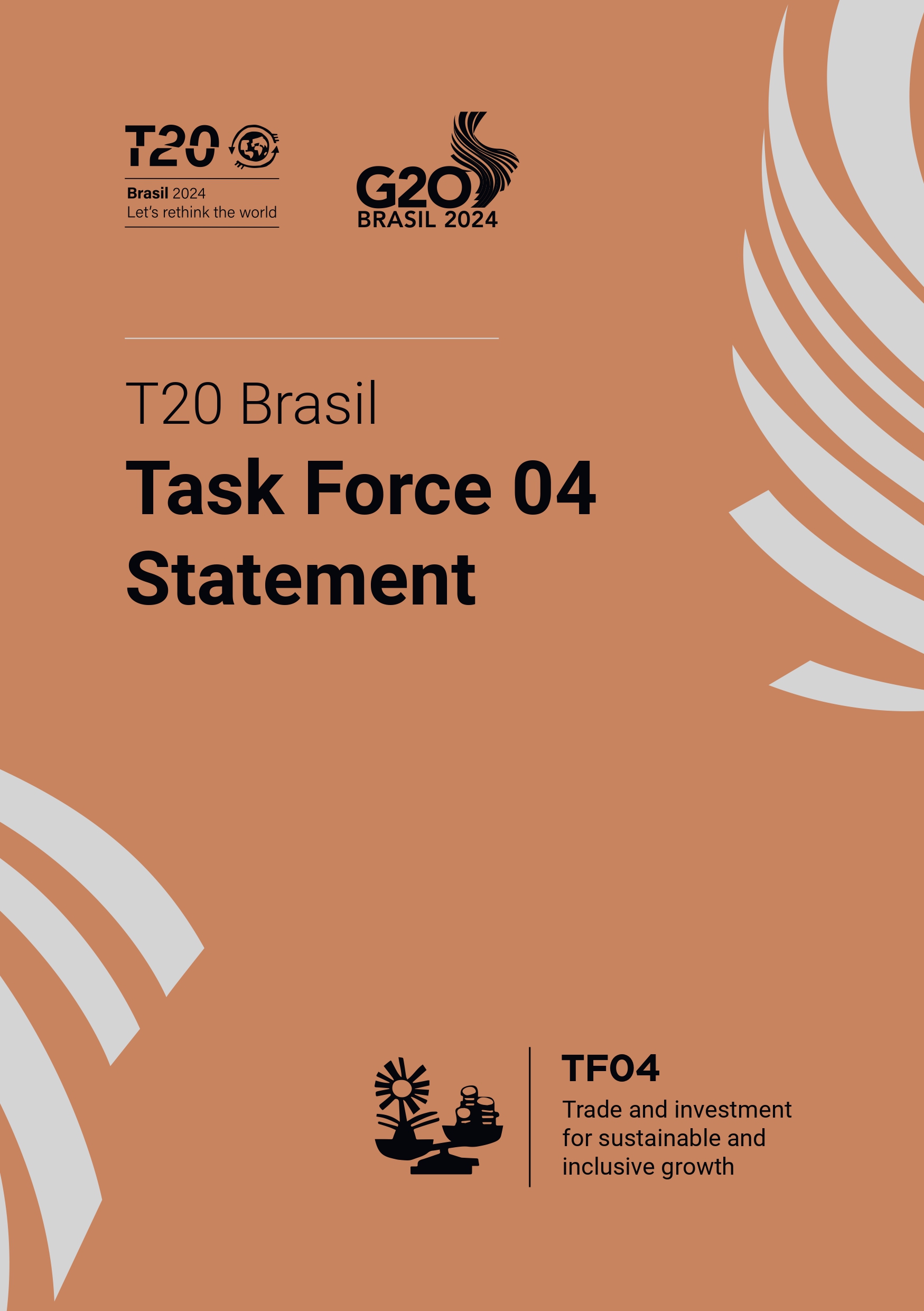
TF04
Trade and investment for sustainable and inclusive growth
TF04 is dedicated to leveraging trade and investment mechanisms to achieve the Sustainable Development Goals (SDGs) outlined in the 2030 Agenda. It intends to put forward innovative ideas not only for the Trade & Investment Working Group, but also for the Working Groups on Agriculture, on Environment and Climate Sustainability, Women’s Empowerment, Digital Economy, and Employment all in the Sherpa Track, but also the Task Force for a Global Alliance Against Hunger and Poverty.
This TF tackles several critical issues through these subtopics, contributing to accelerate progress towards multiple SDGs:
4.1. Trade and investment to fight inequality, poverty, and hunger, and foster social inclusion: Emphasizing the pivotal role of trade and investment in addressing societal challenges, the task force aims to harness these mechanisms to combat inequality within and among countries, poverty, and hunger while promoting social inclusion and food security (SDGs 1, 2, 8, 9, 10, and 17).
- Celio Hiratuka, IE-UNICAMP - Institute of Economics, State University of Campinas (Brazil)
- Valeria Pineiro, IFPRI - International Food Policy Research Institute (United States)
- Bipul Chattopadhyay, CUTS - Consumer Unity and Trust Society (India)
4.2. Trade and investment, food security and climate action: Recognizing the impacts of trade and investment in climate change and its importance for food security, the task force will focus on fostering sustainable practices and policies within these realms to contribute to global sustainability goals. It will also discuss the use of sustainability standards as potential non-tariff barriers that might disproportionally affect developing countries and threaten global food security (SDGs 2, 8, 10, 13, 14, 15, and 17).
- Marcos Jank, Global Agribusiness Center, INSPER (Brazil)
- Camila Dias de Sá, Global Agribusiness Center, INSPER (Brazil)
- Noémie Laurens, Graduate Institute (Switzerland)
- Kennedy Mbeva, CSER - Centre for Study of Existential Risk, University of Cambridge (United Kingdom)
4.3. Women in trade: Acknowledging the importance of gender equality in trade, policy options and efforts to empower and enhance the participation of women in trade-related activities will be put forward, thereby fostering economic growth and inclusivity (SDGs 5, 8, 16, and 17).
- Amrita Bahri, ITAM - Instituto Tecnológico Autónomo de Mexico and WTO Co-Chair, (Mexico)
- Jan Yves Remy, SRC-UWI - Shridath Ramphal Centre for International Trade Law, Policy and Services, University of West Indies, and WTO Chair (Barbados)
- Marina Egydio de Carvalho, Women Inside Trade (Brazil)
4.4. Trade and digital transformation: Considering the increasing role of digital transactions to foster trade and investment, the task force explores how trade and investment can harness digital technologies for increased efficiency, innovation, and global connectivity (SDGs 8, 10, and 17).
- Carlos Primo Braga, Fundação Dom Cabral (Brazil)
- Douglas Lippoldt, CIGI - Centre for International Governance Innovation (Canada)
- Martina Ferracane, EUI - European University Institute (Regional)
4.5. Promoting greater participation of MSMEs in trade and investment: Recognizing the potential of Micro, Small, and Medium-sized Enterprises (MSMEs) to promote growth and create new opportunities for common people, the task force endeavors to promote as more thorough access to foreign markets and facilitate their greater integration into global trade networks, enhancing their contribution to economic growth and reduce inequalities (SDGs 9, and 17).
- Michelle Ratton Sanchez-Badin, CCGI-FGV - Centre on Global Trade and Investment, Getulio Vargas Foundation (Brazil)
- Magali Favaretto, CCGI-FGV - Centre on Global Trade and Investment, Getulio Vargas (Brazil)
- Mehmet Sait Akman, TEPAV - The Economic Policy Research Foundation of Turkey (Turkey)
- Xinquan Tu, Institute of WTO Studies, UIBE - University of International Business and Economics (China)
4.6. Dealing with neo-protectionism and the changing features of global value chains: In the face of evolving global economic landscapes, the task force addresses challenges posed by neo-protectionism and the changing features of global value chains, seeking strategies to adapt and ensure inclusive growth, particularly in developing countries (SDGs 2, 9, and 17).
- Leane Naidin, CINDES - Centre on Integration and Development Studies (Brazil)
- Lia Valls Pereira, CINDES - Centre on Integration and Development Studies (Brazil)
- Maarten Smeets, TIRN - Trade and Investment Research Network (Global)
- Faizel Ismail, University of Cape Town (South Africa)
By addressing these critical sub-topics, the T20 Brasil TF04 endeavors to harness the power of trade and investment to drive sustainable, inclusive, and equitable growth in alignment with the SDGs of the 2030 Agenda.
Click here to access TF04's LinkedIn community: https://www.linkedin.com/groups/12948086/
LEAD CO-CHAIRS

Vera Thorstensen
Head of the Centre for Global Trade and Investment, Fundação Getúlio Vargas

Axel Berger
Deputy Director (interim), German Institute of Development and Sustainability (IDOS)
TASK FORCE STATEMENT
